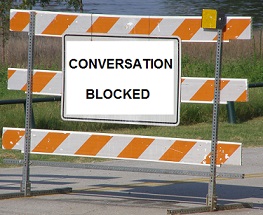Responding to Keep Conversations Flowing
by Kathy Slattengren, M. Ed., Priceless Parenting (sign up for monthly parenting newsletter and receive 20+ printable charts for kids and parents)
(listen to article read by the author)

Have you ever unintentionally shut down a conversation with your kids? Perhaps you said something and your children stopped talking or left the room. What was it that triggered their flight behavior?
For some reason they no longer felt safe talking to you so they left. You then realized your response accidentally stopped the conversation. There are many ways to unintentionally stop conversations.
Saying Things That Stop Conversation
It’s easy to respond to your children in ways that shutdown the conversation. In his book
People Skills, Robert Bolton identifies conversation 12 roadblocks.
Being judgmental:
- Criticizing: "That wasn’t a very smart thing to do."
- Name calling: "You are a little brat!"
- Diagnosing: "You’re procrastinating on getting your project done because you are afraid of failing."
- Praising Evaluatively: "You’re awesome! The tryouts will be breeze for you."
Avoiding the child’s concerns:
- Diverting: "It’s not that big a deal. Let’s talk about something more pleasant."
- Logical arguments: "You only weigh 80 pounds. You are not overweight."
- Reassuring: "There’s nothing to worry about. I’m sure you’ll remember your lines in the play."
Suggesting solutions:
- Ordering: "You need to study at least two hours every night."
- Threatening: "If you don’t stop complaining, I’m never taking you here again!"
- Moralizing: "Kind children do not act that way."
- Excessive/Inappropriate Questioning: "Why did you do that? What were you thinking?"
- Advising: "You’d have a lot more friends if you were a little more positive."
Bolton suggests that whenever someone is experiencing stress you should especially try to avoid these roadblocks. However when you or your kids are under stress, it is extremely easy to accidentally use these conversation roadblocks.
Unintentionally Using Conversation Roadblocks
Let’s take a look at examples where parents ended up using one of these roadblocks.
Parent: “How was the pool party?”
Child: “It wasn’t very fun. We couldn’t go in the hot tub.”
Parent: “You love the slides at that pool. At least that must have been fun.”
Child: “It was cold and there was nowhere to really warm up.”
Parent: “Nobody is going to want to invite you to a party if all you do is complain.”
Child: “You don’t understand!” (storms off)
This child seems upset by something that happened at the party. How might this conversation have gone differently if the parent’s response to the child’s first comment was “Wow, you sound disappointed.”
Here’s another situation where the parent ends up using a conversation roadblock.
Child: “Chris and Adrian wouldn’t let me play with them at recess.”
Parent: “Did you ask someone else to play?”
Child: “Everyone else was busy. I had nothing to do the whole time.”
Parent: “You need to be brave and join whatever the other kids are doing.”
Child: “You’re not listening! Chris and Adrian were really mean to me.”
In this case the parent jumped to solving the problem which left the child not feeling heard. Instead the parent could have tried validating the child’s feelings by responding “It sounds like you felt sad that Chris and Adrian wouldn’t play with you.”
The child might reply “No, I was mad so I kicked Chris. He tattled on me so I had to sit down the rest of the time.” By avoiding conversation roadblocks, the child can say what’s on his mind.
One more example, suppose your child announces in the morning “I’m not going to school today.” How do you respond? It’s tempting to say something like “Oh yes you are.” Ordering your child to go to school or lecturing on the importance of school will shut down the conversation. Instead you could say “Tell me more.” This encourages your child to continue talking about what’s going on.
Responding in Ways That Help Your Child Feel Heard
Good listening takes time, patience and attention. You can't fully listen while also watching TV or looking at your phone. Communication involves not only words but also body language, eye contact and tone of voice. To understand your child's message, you need to hear the words and watch how they are said.
If you want your children to feel heard, a good approach is to
- Stop what you are doing.
- Listen carefully to both your child’s words and body language.
- Identify your child’s feelings.
- Respond in a way that encourages more discussion.
This approach will encourage your child to feel safe enough to continue talking. Even though you may not agree with your child you can always acknowledge their feelings or ask for more information. Your child is likely to feel heard when you openly listen.
Being a good listener takes practice. Try spending five minutes today listening to your child - no interruptions, no advice, no lectures. Keep the conversation going and watch how your child responds to your undivided attention.